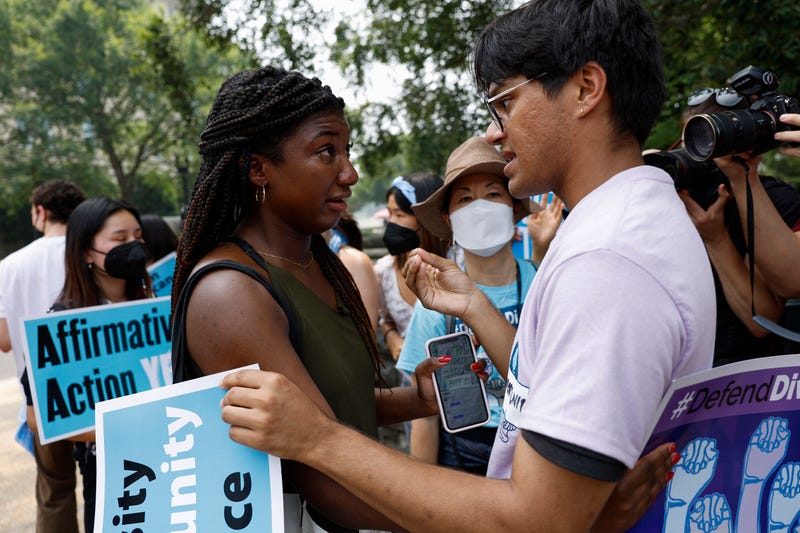
(WBEN) - The conservatively-dominant U.S. Supreme Court ruled Thursday against affirmative action in college admissions. Race can not play a role in determining acceptance into schools in order to create diversity in student bodies.
This landmark decision, Students for Fair Admissions v. Harvard, abrogates the 2003 decision of the Supreme Court case, Grutter v. Bollinger.
"In the past, using race was justified as a way to create diversity at universities. And ... diversity was important. It helped eliminate discrimination, it also educated people on other races and so on. However, in that [2003] case, the Supreme Court said someday we won't need this at all, because we'll have achieved all those things," says Attorney Paul Cambria.
Fast forward to today.
The court determined that Harvard and the University of North Carolina’s admissions policy violated the equal protection clause of the 14th Amendment.
Cambria explains, "The Supreme Court said that all the programs that were used in the past, basically lacked focus, lacked any kind of measurement of objectives obtained used race negative, as opposed to positive and did not provide for any kind of ending point. In other words, the goal should have been achieved and there should be no more need for this kind of situation.
What you're looking at here is some conservative justices who basically are saying, race should not be a factor in evaluating whether a student gets in or not. It ought to be the individual student's achievements. Race shouldn't be a part of it."
Cambria describes the decision as "murky" as the attorney is unaware of what the Supreme Court would "tolerate or accept" as a basis of admittance.
How will this impact the process of admissions for our local colleges?
"That's a hard question to answer because the people who are making these decisions can emphasize other things other than race, but still achieve some kind of racial quotient or quantity. Because in the past, they may rely on race, but now they'll say, 'Oh, well, it's ... this score that they got, or this social situation that they were brought up into and how much they achieved given all those negatives.' I mean ... they can fix the goal and figure out some other category to enhance to get there," says Cambria.
This decision came with some dissention from elected leaders, including President Joe Biden and New York Governor Kathy Hochul.
"This is a dark day for democracy and for equality," said Governor Kathy Hochul on Thursday. "And to make the presumption that today, in 2023, that our country is colorblind, is incorrect. That is not the norm for people in America today. I've been in contact with our SUNY Chancellor, John King, who will be assessing their policies, but assures us that they'll be considering many factors to understand that diversity is an important part of who we are."
University at Buffalo President, Satish K. Tripathi, issued the following statement:
“As a scholarly community grounded in values of social justice, we are committed to cultivating a diverse, equitable and welcoming academic environment for all of our students, faculty and staff. We recognize that UB thrives because of our diversity.
“It is this diversity—of perspective, backgrounds, cultures and lived experiences—that contributes to UB’s dynamic and intellectually stimulating environment. It enriches our research, our scholarly pursuits, our academic discourse—indeed, all that we endeavor to accomplish.
“With the U.S. Supreme Court’s decision today that race-based admissions programs at Harvard and the University of North Carolina violate the equal protection clause of the Fourteenth Amendment, we are working in consultation with the SUNY offices of the Chancellor and the General Counsel to analyze its implications. Once the full analysis is complete, we will communicate the impact of the Supreme Court’s decision on university admissions policies and practices.
“With this analysis of the ruling underway, allow me to reaffirm that our values of social justice will continue to guide us in our expression of our university mission.”
SUNY Chancellor John King released the following statement:
“Today, the US Supreme Court attempted to pull our nation backwards in the journey toward equity and civil rights with an egregious ruling that will have serious impacts on students and families seeking the American dream of opportunity through higher education.
“Race-conscious admissions policies have enriched our institutions and our nation. Yet despite the existence of race-conscious admissions policies, Black and Latino students, along with other groups, are still underrepresented across institutions of higher education as students, faculty members, and administrators. Today’s decision threatens to undermine what progress has been made, by throwing up roadblocks and barriers when what’s needed are better paths and bridges. As Justice Sotomayor wrote in dissent: ‘The Court subverts the constitutional guarantee of equal protection by further entrenching racial inequality in education, the very foundation of our democratic government and pluralistic society.’
“At SUNY, our resolve to provide opportunity for all has never been stronger. The commitment to diversity, equity, and inclusion will continue to be a factor in every goal we pursue, every program we create, every policy we promulgate, and every decision we make.
“On behalf of the students we serve; the faculty and staff who make SUNY a place of excellence; and the communities and employers that rely on SUNY’s diversity for their own success, we know that no court ruling – however misguided – can shake our understanding that our pursuit of diversity, equity, and inclusion, within the law, will always be integral to ensuring that SUNY is the best public system of higher education in the country.”


